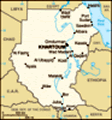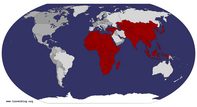Advertisement
The plan in Atbara was to catch a bus to the ancient site of Meroe and then flag down something heading to Khartoum. Unfortunately no-one could understand where we wanted to go and the only bus we could find was not leaving until 1pm which would make it difficult to find anything later in the day going to Khartoum. In the end we decided to head straight to Khartoum but the bus was not leaving until 8am so we sat down and had a cup of tea. The tea ladies set up their stands on every street corner. They consist of little more than a brazier and a lockable chest covered with jars of tea, coffee and spices. Stools or old oil cans provide the seating. It is a great way of chatting to the locals.
Khartoum is stinking hot 48 degrees and extremely dusty, it's as if the desert will claim the city at any time. We headed to the Ministry of Tourism to obtain our photography permit. We have been taking photos in northern Sudan without a permit but they are a little more sensitive in Khartoum about cameras so we thought the permit would save us hassle
and its free so it is really no bother. When we got there though they told us to come back tomorrow so in the end we decided not to bother and take our chances and have had no problems.
One great thing about Khartoum is that there is a great variety of food and after some pretty nondescript food for the last few weeks, this was really exciting, if not ludicrously expensive, a cup of coffee matched London prices and a box of Special K a whopping 23 SP or £6, still it was worth it! For a couple of nights we enjoyed Indian and a surprisingly good Italian pizza.
For a bit of sightseeing, we hired a driver and went to the confluence of the Nile, where the Blue Nile from Ethiopia and the White Nile from Uganda meet. It was nothing special to look at but interesting for us because we are heading to both sources of the Nile.
In the old town of Omdurman we checked out the Hamed al Nil Tomb. Sheik Hamed al Nil was a 19th century Sufi leader of the Qadiriyah order. This is where the Sufis perform their weekly
ceremony. Unfortunately this only occurs on Fridays so we missed out on seeing the whirling dervishes. The tomb is set in a huge cemetery in what looks like the middle of nowhere. We also went to Madhi's tomb which is infamous in Sudan. Mohammed Ahmed was the son of a boat builder and a devout and ascetic preacher. He proclaimed himself as the Madi, sent to reform Islam and overthrow the rule of the Turks. In its place he claimed that he would liberate Arabia in a recreation of the life of the Prophet Mohammed. Under the Madhi the British lost control of Sudan but soon after the British re-conquest of Sudan they blew up Madhi's tomb to prevent it becoming a rallying point for disaffected Sudanese. The present tomb was rebuilt in 1947.
Our final stop was the camel market. This was a long way out of town and in the middle of the desert. It was quiet today, market day being Friday but it was still not what we expected. Covering a huge area were cows, horses, donkeys and goats (but strangely no camels) somehow surviving with little water and no shelter in the heat and not
a blade of grass in sight. We have no idea how people, and the animals for that matter, survive in such harsh conditions.
The highlight of our trip was visiting Mohammed's family in Bahari, north Khartoum. We met Mohammed on the ferry from Aswan to Wadi Halfa. He invited us to stay with his family and we accepted. Bahari is a long way out of Khartoum, it took nearly an hour to get there and was completely different from the modern buildings in parts of Khartoum. Mohammed's family are very poor and live in small mud brick huts although, due to the heat, most of their time is spent outside, including sleeping. Showering is carried out using a bucket and cup, the toilet is outside and the kitchen is no more than a mud hut with a few vital supplies. Despite their poverty, we have never known such generosity and hospitality. The whole family and neighbourhood popped in to say hello and shake our hands and they smile all the time. Not once did they complain about how hard life was, all these people want is opportunity. What we found particularly beautiful was the strong sense of community and
the Sudanese love and joy of children.
Mohammed's family has lived in the same house since he was born, with his extended family around. His friends all live down the street and now have their own families - 8 children seems to be the norm. The girls worked hard all day, cleaning, sweeping, preparing food and fetching drinks for everyone while the men sat round drinking tea. They were so happy to be practicing their English and laugh at our Arabic!
Mohammed's Aunt was in charge of preparing the coffee. The beans from Ethiopia are ground down by hand and then funneled into the pot of boiling water with special spices added before being poured into a fine china coffee pot. The Sudanese love sugar and a small cup of coffee comes with at least 4 teaspoons. It was absolutely delicious and it was only polite to have 4 cups!
Married women in Sudan traditionally cover their finger tips, toes and the soles of their feet with henna, which is made from leaves and oils and blackens the skin. Of course I was asked if they could put some henna on me, it was hard to say
no but I did limit it to one hand. Everyone was very pleased with how it turned out and I suspect it will hang around for a couple of weeks!
For dinner we had a traditional Sudanese meal eaten with the hands consisting of a meat stew and vegetable, bread, injira (a sour pancake used to scoop up the stew) and salad, followed by delicious watermelon and of course, sweet tea. Later in the evening, Mohammed took us to meet some more of his friends. The local hang out was down the lane in a small “park”. Here the men meet, drink tea (a tea lady is always near) smoke sheesha and have a laugh. Women of course are not allowed to smoke and do not attend these gatherings so I felt very privileged to have been invited. Once again people's friendliness blew us away. They were really interested in NZ, although we wish we had a map as they all think it is in Europe. The whole time we were with Mohammed we were not allowed to pay for anything not even the taxi ride back to Khartoum.
Mohammed very kindly took us to the bus station
at the crack of dawn so that we could catch the bus to Gedaref, our overnight stop before heading to the Ethiopian border.
Khartoum bus station is completely chaotic. First we had to buy a token to get into the bus station. Then we had to show our passports to the police who to be honest could not have cared less so we are not sure why they even bother, then we were swamped with touts. We finally found the bus only to be asked to get off and have our passport checked by security again.
The reason for staying in Gedaref is because the guide book says that Gallabat which is on the border with Ethiopia is a dirt track. Well I hate to think how bad Gallabat is because this place is a dusty hell hole. The accommodation here is the worst we have seen on our trip. The recommendation in the book, Al Hawaard Tourist Hotel was completely wrong, it is most certainly not a new hotel and sure as hell was not clean. The next one we checked, El Motawakil Hotel was ridiculously expensive and the Amer Hotel was revolting which sent us back
to our first place. We reluctantly checked in, despite all the flies but it was the last straw when there was no running water and a toilet that looked and smelt like it was 100 years old. In the end we decided to spend the money and go to El Motawakil. This hotel is £61 per night, the most expensive since we started this trip and its pretty average to say the least and infested with bugs. Still it is marginally better than the other options.
Sudan is generally expensive and the accommodation overpriced for what it is. Many manufactured goods are imported which keeps the prices high and it is still under American sanctions so its understandable.
Sudan is not catered to tourists at all, which is probably why we have not seen any since leaving Wadi Halfa. It has been a hard country to travel in. The heat and dust is unrelenting and there are not many options for accommodation. However, it is an amazing country to visit. You won't believe how friendly and kind the people are until you sample their hospitality. People are keen to show you that, despite what the media may says,
not all of Sudan is unsafe, and many parts are likely to be some of safest in Africa!
We are now heading to the border for a month in Ethiopia where it should be much cooler (hopefully) although the mosquitoes will be out in force!
Advertisement
Tot: 0.054s; Tpl: 0.017s; cc: 13; qc: 19; dbt: 0.0294s; 1; m:domysql w:travelblog (10.17.0.13); sld: 1;
; mem: 1.1mb


















